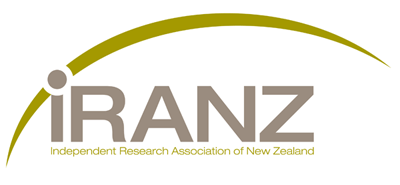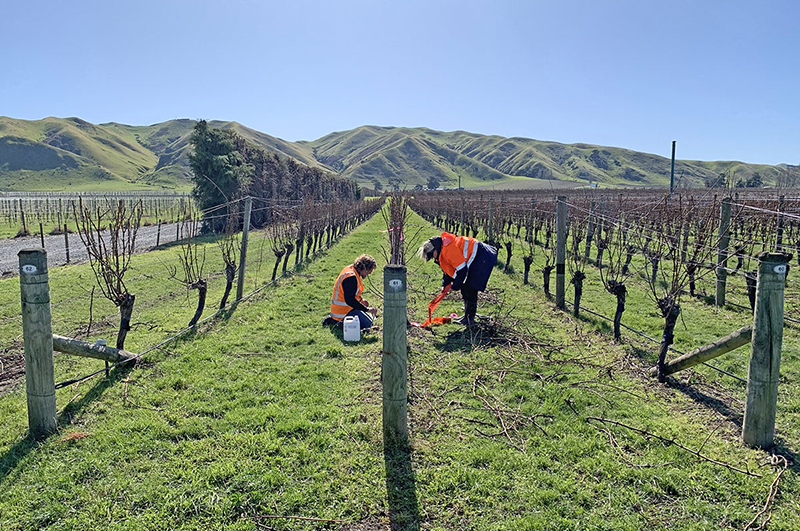IRANZ news briefs
Speaker's Science Forum: Food security in the face of global challenges
The first of the Speaker’s Science Forum series for 2023 was held on 21 February at Parliament. The central focus of the forum was the major risks to food security in Aotearoa New Zealand and how we can prevent or mitigate these issues to ensure a food secure future.
Dr David Rankin, GreenTech Group Leader at Lincoln Agritech, gave a presentation saying that climate change is altering our weather patterns and increasingly affecting regional food production and hence food security. As key agricultural and horticultural areas in New Zealand are becoming hotter and drier, he asked will we be able to continue to produce enough food for 40 million people?
Dr Rankin proposed that the impacts of climate change on food production can be proactively mitigated, but not eliminated, by immediate climate action. Recent research has shown that methane mitigation has the potential to offer the greatest effect in the shortest time: cutting methane emissions 45% by 2030 could avoid 0.3°C warming by 2040. Dr Rankin explored what this could mean for New Zealand, especially with respect to our agricultural industry including potential upcoming and commercial solutions for emission mitigation. Approaches range from animal and pasture breeding efforts to food additives and wearable tech for cattle.
MRINZ publishes record number of papers in 2022
Medical Research Institute of New Zealand (MRINZ) research teams hit a record number of MRINZ publications across one year, with a total of 92 since January 2022, including five in the New England Journal of Medical and five in JAMA - two of the most prestigious international medical journals.
The fifth 'The JAMA Network' publication of the year, published in December, informs the latest findings from the REMAP-CAP study, the six-month outcomes across treatments for patients with COVID-19, including: corticosteroids; antiviral agents; immune modulators; convalescent plasma; anticoagulation and antiplatelet therapy.
This is important research as clinical trials in COVID-19 typically look at short-term outcomes, such as organ failure or 28-day mortality, with fewer published trials assessing whether treatments affect longer-term survival and patient-centered outcomes, such as disability and health-related quality of life.
Read more about the Medical Research Institute of New Zealand >>
Motu: Covid-19's impact on the economy
Dr John McDermott, Chair of IRANZ, Executive Director at Motu Economic and Public Policy Research, and a well known macroeconomist, addressed the Port Nicholson Rotary Club on 25 January with reference to the things that can happen in an economy when external events such as a pandemic can drive consumers, businesses, governments, and central banks to react in different ways.
To provide an example of how inflation can be generated and controlled, John referred to a 1970s story of the Washington DC Capitol Babysitters Co-op, whose purpose was to fairly distribute the responsibility of babysitting between its members. The story is often used as an allegory for a demand-oriented model of an economy. The allegory illustrates several economic concepts, including the "paradox of thrift" and the importance of the money supply to an economy's well-being.
Brent Gerrard reported on the talk for the club.
Motu: Difficulties to accessing childcare and the effects on mothers - seminar
Motu Economic and Public Policy Research's Senior Fellow Isabelle Sin is speaking at a Manatū Wāhine - Ministry for Women Zoom webinar on 28 February exploring the difficulties to accessing childcare and the effects on mothers’ labour market outcomes, and the wider issues and barriers that women experience when it comes to finding, and staying in, employment. The discussion is based on recent research reports by Motu Economic and Public Policy Research.
Changes at the helm for Verum Group
After over a decade, Verum Group has farewelled Dr James Pope as CEO and then a Director of Verum Group.
Throughout his tenure, James was involved in research related to mining environmental management, treatment of contaminated water from mining and agriculture as well as geothermal geochemistry, as well as being adjunct to the Department of Geological Science at the University of Canterbury and the Great Lakes Institute for Environmental Research at the University of Windsor.
Verum Group was formerly CRL Energy, a laboratory, consulting and research company that operated in the energy and minerals sector. The company, led by James, rebranded in 2018. Prior to this James worked at CRL Energy for 15 years as first a research manager and then general manager.
Andy Englefield, who formally coordinated the Air Quality team in Christchurch, has taken over the helm, and was appointed Chief Operating Officer in December 2022.
Andy is specialised in point source and ambient emissions for industrial and commercial clients. Prior to his new role, Andy managed the workplace exposure monitoring services that Verum Group provides while upholding quality and best practice procedures. He also is involved in environmental monitoring, performing site investigations, sampling, and reporting for resource consent requirements.
Andy says his priorities will be ensuring that Verum Group continues providing high quality and responsive services. Away from work Andy has a young family, enjoys classic cars, barbequing, and exploring the outdoors.
Verum Group welcomes news staff
Zingara McDougall has recently joined the Verum Group team as the Financial Administrator for Verum Group. Zingara is currently a CAANZ Provisional Accounting Technician, nearing completion of her Diploma in Business Management through Te Pūkenga. As well as accounts, she is responsible for delivering effective financial reporting to support the success of the company.
Verum group has also recently taken on two new graduates. Caleb joined Verum in November 2022, just two days after completing his BSc at the University of Canterbury, with a major in chemistry and a minor in physics. His work involves a variety of sampling and analysis for the fuels team in Christchurch and the team in Greymouth. Also joining Verum is Kimberley McKee, a new graduate currently in a training phase. She assists the emission team with stack testing and does odd jobs around the office. Kimberley has a BSc, focusing on geography, environmental science, and chemistry.
Read more about Verum Group >>
Lincoln Agritech: Clearing a research path for rangatahi
Lincoln Agritech has again provided an internship for a rangatahi (young person) with the help of Pūhoro STEMM.
Summer intern Taylor Te Puni (Te Āti Awa) is now starting his second year of a BSc in biochemistry at the University of Canterbury, even more enthusiastic after spending the summer working with Lincoln Agritech’s Biotechnology group.
Cawthron: Devastating floods destroy aquatic life in Nelson's Maitai River
In August 2022, devastating floods hit the top of the South Island, destroying aquatic life in its rivers and estuaries.
Journalist Alexa Cook from TV3's Newshub interviewed scientists from the Cawthron Institute about the ongoing impact from the event, which is believed to have killed 80 percent of the fish in Nelson's Maitai River. The scientists say it will take years for the area to recover.
Cawthron: Scientists observe warming seas for harmful algal blooms
In this RNZ article Niva Chittock reports on the work of the Cawthron Institute monitoring New Zealand's waters for harmful algal blooms - a situation that could arise more often if rising sea temperatures entice more harmful algal blooms from the sub-tropics to New Zealand's shores.
Bragato: Ground wētā in the Awatere
The endemic ground wētā, Hemiandrus bilobatus, lives in burrows in the soil, but its presence can negatively affect wine grape production. This is especially so in vineyards in the Awatere region in Marlborough. Vine growth in early spring provides the ground wētā with a buffet of fresh buds to feed upon, which causes damage detrimental to vine growth and fruit yield.
A Bragato research team is hoping to develop an environmentally and economically sustainable solution to the growing problem of ground wētā.
Motu: Quarterly Post-World War II Real GDP Series for New Zealand
The prospect of recession is looming ever large as central banks act to restore price stability. To understand the nature of recessions, you need a long historical record.
Unfortunately, official Aotearoa New Zealand data on quarterly real Gross Domestic Product (GDP) only goes back to 1987, limiting our ability to understand the nature of growth or frequency of recessions.
To help, Motu Research's John McDermott and Viv Hall (Professor at Victoria University of Wellington) recently updated their estimates of quarterly GDP back to 1947. This gives 75 years’ worth of economic history we can use to deepen our understanding of the Aotearoa economy.
The data is available for free on Motu's website.
Malaghan visiting researcher: Dr Michelle Linterman
New Zealand immunologist Dr Michelle Linterman is based at the Babraham Institute in Cambridge where she leads a research group investigating how our immune system responds to new infectious agents as we age. She recently spent time at the Malaghan Institute collaborating with colleagues and sharing her research into vaccine immunology.
Malaghan’s Hugh Green Cytometry Centre Named Cytek Centre of Research Excellence
The Malaghan Institute’s Hugh Green Cytometry Centre has entered into a strategic partnership with Cytek Biosciences, recognising its leadership and innovation in full spectrum flow cytometry, a technology advancing the understanding of the immune system that underpins all research at the Malaghan Institute.
BRANZ: Supporting better mental health
Earlier BRANZ research showed mental health and suicide to be major issues facing the construction industry. This year, new research with a wider lens across all industry occupations illuminated the full extent of the issue and the demographic groups most at risk. This new perspective will enable targeted interventions and more-effective development of tailored support.
In the ground-breaking 2018 BRANZ study Mental health in the construction industry, they highlighted that construction workers were more likely than the rest of the workforce to lose their life to suicide.
A catalyst for action, the research prompted the establishment of workplace mental health programme MATES in Construction (MATES) in New Zealand in 2019.
Now, MATES has data from two new studies published this year, which it is using to target its interventions more effectively.
Dragonfly Data Science: In-house innovation creates more useful, beautiful maps
Frustrated with the limitations of current web mapping software, Dragonfly’s digital cartographer Ian Reese set about making something better. Now this new method is being rolled out to Dragonfly’s clients.
Ian says he was irritated at being stuck using outdated and unsupported software to handle raster data. (Raster data is pixelated data where each pixel represents a specific geographical location.)
“In the last 10 years, web mapping software has moved on from stacked raster tiles to vector tiles. In this transition, the capabilities of handling multiple raster datasets in web mapping applications have been lost.”
Mātai Interns & Turanga FM Interview
Ariana Brown and Jackson Clarke, two of 16 Mātai Medical Research Institute interns talk to Turanga FM about their background studies, what Mātai has to offer, and how they are impacting their community as a whole.
Date posted: 27 February 2023

